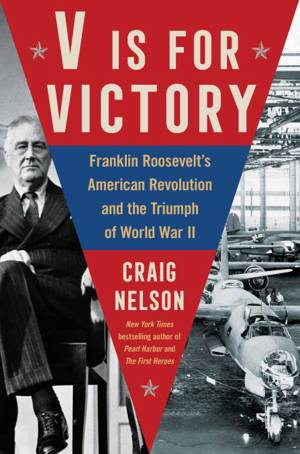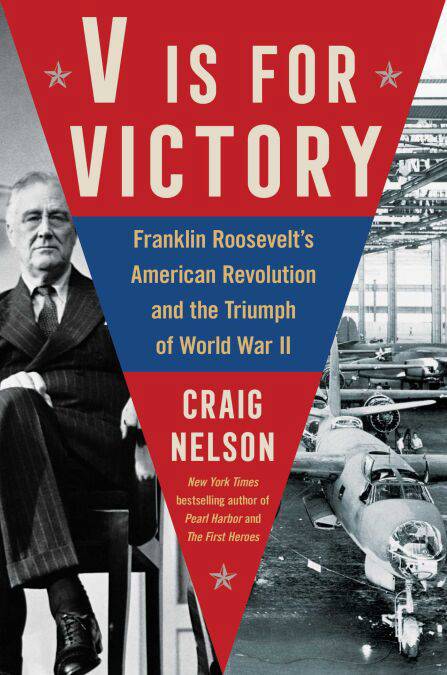
- Retrait gratuit dans votre magasin Club
- 7.000.000 titres dans notre catalogue
- Payer en toute sécurité
- Toujours un magasin près de chez vous
- Retrait gratuit dans votre magasin Club
- 7.000.0000 titres dans notre catalogue
- Payer en toute sécurité
- Toujours un magasin près de chez vous
V Is For Victory EBOOK
Franklin Roosevelt's American Revolution and the Triumph of World War II
Craig Nelson
Ebook | Anglais
19,00 €
+ 19 points
Format
Description
A NEW YORKER BEST BOOK OF 2023
“Belongs in the library alongside the histories and biographies of Martin Gilbert, Arthur Schlesinger, Jr., and David McCullough.” —Doug Stanton, #1 New York Times bestselling author of Horse Soldiers
In this epic and definitive history of the American home front during World War II, New York Times bestselling historian Craig Nelson reveals how FDR won the support of a nation antagonistic to war in Europe and pushed both government and industry to build “the arsenal of democracy”—the secret weapon that won the war.
In 1938, the United States was so politically isolationist and pacifist that its defense forces were smaller than Portugal’s. That same year, Franklin Delano Roosevelt ordered the federal government to spark a dramatic expansion in domestic airplane production, and this minor effort—three years before the attack on Pearl Harbor—would in time become what Roosevelt called “the arsenal of democracy,” the full-throttle unleashing of American enterprise and ingenuity that was the secret weapon for victory in World War II. Signaled by Roosevelt’s public fight with Lindbergh—known as the Great Debate—victory at land, sea, and air across the globe began at home.
In this “richly detailed, highly readable account of presidential leadership in perilous times” (New York Journal of Books), Craig Nelson traces how under FDR, the United States rose from poverty and solitude to defeat the greatest evils of the 20th century. By transforming what Americans thought they could achieve, FDR’s efforts ended the Great Depression; conquered the fascists of Germany, Italy, and Japan; birthed America’s middle-class affluence and consumer society; led to jet engines, computers, radar, the military-industrial complex, Big Science, and nuclear weapons; triggered a global economic boom; and turned the U.S. military into a worldwide titan—with America the undisputed leader of world affairs. While the arsenal of democracy has come to mean this miracle of American industry, when Roosevelt said it, he meant the miracle of the American people.
Revealing an era when Detroit was Silicon Valley; Ford was Apple; and Sears, Roebuck was Amazon, while filled with reflections on our own time, V Is for Victory draws on five years of research to create a powerful and essential narrative largely overlooked in conventional histories of the war but which, in Nelson’s skilled, authoritative hands, becomes an illuminating and important work destined to become an American history classic.
“Belongs in the library alongside the histories and biographies of Martin Gilbert, Arthur Schlesinger, Jr., and David McCullough.” —Doug Stanton, #1 New York Times bestselling author of Horse Soldiers
In this epic and definitive history of the American home front during World War II, New York Times bestselling historian Craig Nelson reveals how FDR won the support of a nation antagonistic to war in Europe and pushed both government and industry to build “the arsenal of democracy”—the secret weapon that won the war.
In 1938, the United States was so politically isolationist and pacifist that its defense forces were smaller than Portugal’s. That same year, Franklin Delano Roosevelt ordered the federal government to spark a dramatic expansion in domestic airplane production, and this minor effort—three years before the attack on Pearl Harbor—would in time become what Roosevelt called “the arsenal of democracy,” the full-throttle unleashing of American enterprise and ingenuity that was the secret weapon for victory in World War II. Signaled by Roosevelt’s public fight with Lindbergh—known as the Great Debate—victory at land, sea, and air across the globe began at home.
In this “richly detailed, highly readable account of presidential leadership in perilous times” (New York Journal of Books), Craig Nelson traces how under FDR, the United States rose from poverty and solitude to defeat the greatest evils of the 20th century. By transforming what Americans thought they could achieve, FDR’s efforts ended the Great Depression; conquered the fascists of Germany, Italy, and Japan; birthed America’s middle-class affluence and consumer society; led to jet engines, computers, radar, the military-industrial complex, Big Science, and nuclear weapons; triggered a global economic boom; and turned the U.S. military into a worldwide titan—with America the undisputed leader of world affairs. While the arsenal of democracy has come to mean this miracle of American industry, when Roosevelt said it, he meant the miracle of the American people.
Revealing an era when Detroit was Silicon Valley; Ford was Apple; and Sears, Roebuck was Amazon, while filled with reflections on our own time, V Is for Victory draws on five years of research to create a powerful and essential narrative largely overlooked in conventional histories of the war but which, in Nelson’s skilled, authoritative hands, becomes an illuminating and important work destined to become an American history classic.
Spécifications
Parties prenantes
- Auteur(s) :
- Editeur:
Contenu
- Nombre de pages :
- 448
- Langue:
- Anglais
Caractéristiques
- EAN:
- 9781982122935
- Date de parution :
- 22-05-23
- Format:
- Ebook
- Protection digitale:
- Adobe DRM
- Format numérique:
- ePub

Les avis
Nous publions uniquement les avis qui respectent les conditions requises. Consultez nos conditions pour les avis.






